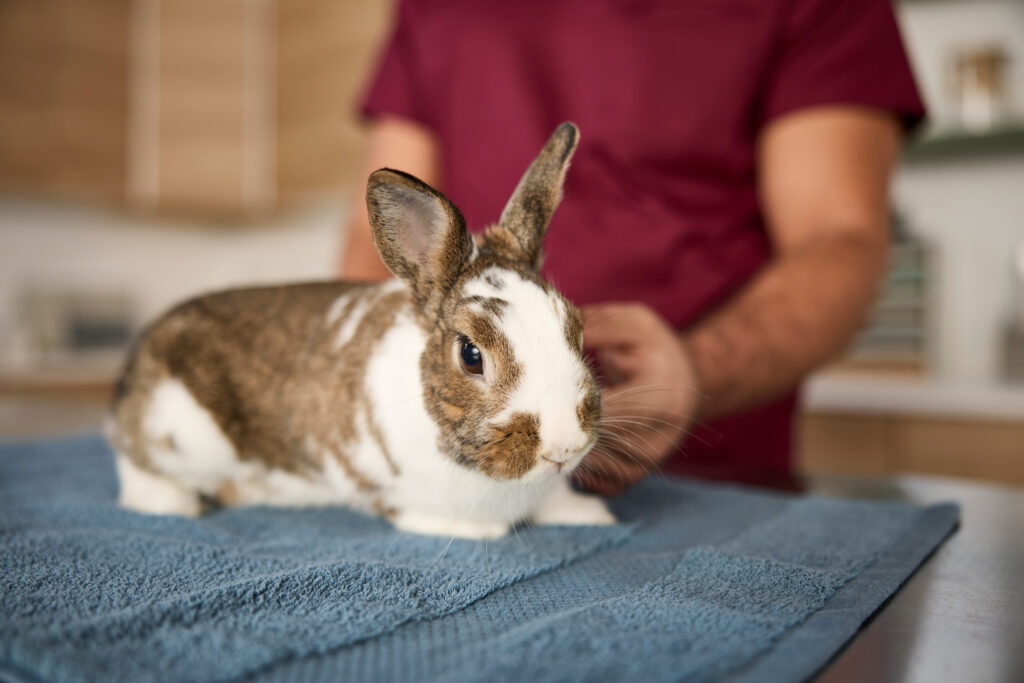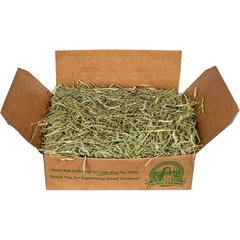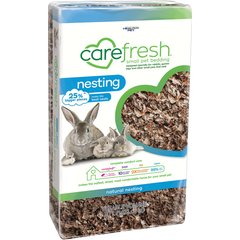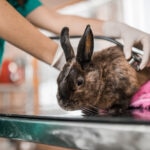What Are Rabbit Allergies? How Are They Treated?

Photo by Chewy
Healthy bunnies dig, eat, chew, and explore with enthusiasm, keeping their sleek coat soft and clean through regular grooming.
When especially happy, rabbits don’t hide it—playful binkies and dramatic flops are telltale signs of a happy, healthy bun.
Sometimes, however, health issues can get in the way of all that joy.
While true allergies in rabbits are not well documented in veterinary medicine, rabbits can develop allergy-like signs such as skin irritation and inflammation or airway irritation. These signs often resemble allergies, making a diagnosis without a veterinary exam challenging.
Let’s look at what can contribute to allergy like signs in rabbits and the steps you can take to help your bun find relief.
Key Takeaways
- Rabbits can theoretically have allergies, but it’s very rare, and possible signs include itching, skin irritation, hair loss, sneezing, watery eyes, and changes in appetite or activity.
- Rabbits could show allergy-like reactions to environmental irritants, parasites, or less commonly food, but this is not well documented at this time.
- Allergies or irritants are managed by identifying and removing triggers, soothing symptoms, and addressing secondary infections.
- Careful selection of rabbits from breeders, minimizing environmental irritants, and regular vet visits can help reduce the likelihood of your rabbit developing allergies.
What Are Rabbit Allergies?
“Allergies occur when a pet’s immune system overreacts to substances that are normally harmless, like pollen, dust mites, or certain foods,” says Eliza O’Callaghan, DVM, managing veterinarian at Small Door Veterinary in New York City.
Because allergies involve the immune system, skin irritation is often a key sign, whether it appears as redness, scaling, crusting, or hair loss. That said, allergies are not the leading cause of skin issues in rabbits.
Overall, allergies in rabbits are rare and not well documented (or at least less studied and reported) compared to allergies in dogs or cats. Still, skin problems remain one of the most common reasons rabbit parents bring their bunnies to the veterinarian.
Lorraine Corriveau, DVM, DABVP, DABLS, a veterinarian at Purdue University Veterinary Hospital, in West Lafayette, Indiana, explains that allergies in pets have a genetic predisposition.
In other pets, allergies often have a genetic link, but this has not been documented in rabbits at this time. When purchasing a rabbit from a reputable breeder, it’s a good idea to ask about the parent’s parents’ health history.
What Are Common Signs of Rabbit Allergies?
Diagnosing allergies will be done by your primary veterinarian by through ruling out other causes of these skin– and respiratory– related issues. But recognizing possible signs of allergies and illness in rabbits can help you take the first steps to help them feel better:
- Excessive scratching or grooming
- Dry, flaky, crusting, or scaly patches on the skin
- Hair loss or thinning fur
- Watery, red, or irritated eyes
- Damp, tear-stained fur around the eyes and cheeks
- Sneezing
- Runny nose
- Reduced appetite or changes in eating habits
- Lethargy or reduced activity
What Causes Rabbit Allergies?
There are several different types of allergies, but three of the most common types of allergies are:
- Environmental allergies: Rabbits can react to dust, mold, and pollen.
- Food allergies: While food sensitivities to specific ingredients in their diet can occur, true food allergies in rabbits are considered rare.
- Parasite-related allergies: Rabbits in general will be itchy with external parasites, but sometimes they can be extra sensitive to fur mites and flea bites, which may trigger an overreaction of the immune system and subsequent intense itching, hair loss, or skin inflammation.
How Do Veterinarians Treat Rabbit Allergies?
After ruling out other causes of skin disease and airway disease such as external parasites, airway irritants, upper respiratory infections, fungal infections, or eye disease, etc your veterinarian might suspect certain allergens as a cause for the immune system overreacting. To treat these symptoms in rabbits, veterinarians work closely with pet parents to identify potential triggers and remove them from the rabbit’s environment.
Dr. Corriveau explains that the first step in treating allergies in pets is gathering as much information from the pet parent as possible. Without a clear starting point, narrowing down the allergen or allergens can be tricky.
“When are you seeing the symptoms? Are they all year round? If they’re present all year, then I must look at things your pet is exposed to daily,” she says.
Parasite Treatment and Control
Unlike for dogs and cats, there are no flea medications currently marketed for rabbits, so it’s extremely important to work with your veterinarian for proper dosing and treatment.
Vets typically treat mites with topical medications specifically tested or proven safe for rabbits.
Never apply medications topically or give oral doses without your vet’s guidance, as this can be very dangerous or even fatal for rabbits. Some mites, like Cheyletiella, are also contagious to humans, so proper handling and hygiene are important.
Eliminating Environmental Allergens and Irritants
If your veterinarian suspects environmental allergens or irritants, small changes in your rabbit’s set-up can make a big difference.
- Hay: While Timothy hay is a popular choice due to its high fiber content, it’s also among the dustiest hay types, which can trigger allergies in both rabbits and their pet parents. First-cut Timothy hay, such as Viking Farmer 1st Cut Timothy Hay, is greener and contains fewer stems than other cuts, reducing dust. Alternatively, switch to Orchard Grass Hay, which is naturally less dusty and often better tolerated by sensitive rabbits.
Recommended Products
- Bedding: Low-dust paper bedding, such as CarefFresh Custom Guinea Pig & Rabbit Natural Paper Bedding, is a better choice than pine or cedar shavings, which can irritate the skin and respiratory system.
Recommended Product
- Strong scents: Minimize strong scents in your home, including candles, air fresheners, and incense. When cleaning your rabbit’s cage or the rooms they spend time in, use pet-safe, non–toxic cleaners. If your bunny is litter box– trained, try unscented paper pellet litter.
Food Allergies
Although food allergies are this is common for cats and dogs, theyfood allergies are considered possible for rabbits but have not been documented. Some rabbits could develop sensitivities to certain ingredients in their diet, but this is speculative.
If a food allergy or food sensitivity is suspected, your veterinarian may recommend an elimination diet, eliminating certain food items that are suspected to be causing a problem, or a limited-ingredient rabbit food.
How Can I Help My Rabbit Feel More Comfortable?
Treating rabbit skin irritation and airway inflammation is an important part of caring for your rabbit, because all that itching, breathing changes, and scratching can lead to secondary infections and further complications.
While you and your veterinarian work to identify and remove allergens and irritants from your rabbit’s environment, your vet may also recommend anti-bacterial ointment for irritated skin or anti-itch spray to provide relief.
Recommended Product
How Do I Prevent Allergies in My Rabbit?
Regular Veterinary Care
Rabbits should see a veterinarian at least once a year, even if they seem healthy, and more frequently if they show any signs of illness, says Amanda Koontz, founder and president of Dolly & Friends Small Animal Sanctuary, in Fairfield, Pennsylvania.
Wellness visits are the best chance to catch problems early, before they become serious. During these visits, your vet will examine your rabbit’s eyes, ears, and skin for irritation, hair loss, and parasites, helping to prevent discomfort before it escalates.
Choose Your Rabbit With Care
When purchasing a rabbit from a breeder, ask about the parents’ health. Knowing the parents’ temperament, care needs, and history of allergies can give you a better idea of what to expect and may help reduce the likelihood of bringing home a bunny with inherited allergies.
If you’re adopting a bunny, ask for current care instructions, including the type of bedding, food, and hay the rabbit has been using. Maintaining consistency can minimize the risk of allergy flare-up and make the transition to your home easier.
Reduce Environmental Allergens and Irritants
While you can’t prevent all irritants and possible allergens, you can make your rabbit’s environment less likely to harbor pesky allergens:
- Limit scented cleaners, perfumes, candles, and air fresheners.
- Choose low-dust, unscented bedding and litter.
- Consider Orchard grass or first-cut Timothy hay.
- HEPA air purifiers and HEPA vacuum cleaners will help minimize any environmental dust.
FAQs About Rabbit Allergies
What does a rabbit allergy look like?
True allergies in rabbits is not well documented. Signs that might look like an allergy, such as itchy or flaky skin, sneezing, watery or red eyes, and nasal discharge, are most often caused by other issues such as mites, environmental irritants, or respiratory infections.
How can you help a bunny with allergies?
Work closely with your veterinarian to rule out other more common causes. Your vet might suggest improving ventilation, switching hay/bedding, and avoiding any harsh chemicals that could be causing skin or airway irritations.
Can rabbits have allergies and sneezing?
Sneezing and nasal discharge is a very common ailment in rabbits. Typically, it is caused by infections, airway irritants, or dental disease. But theoretically, allergic hypersensitivity is possible.







